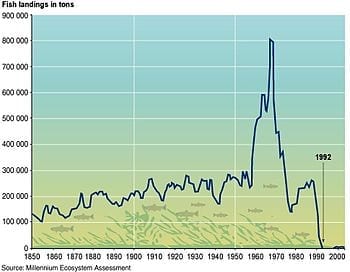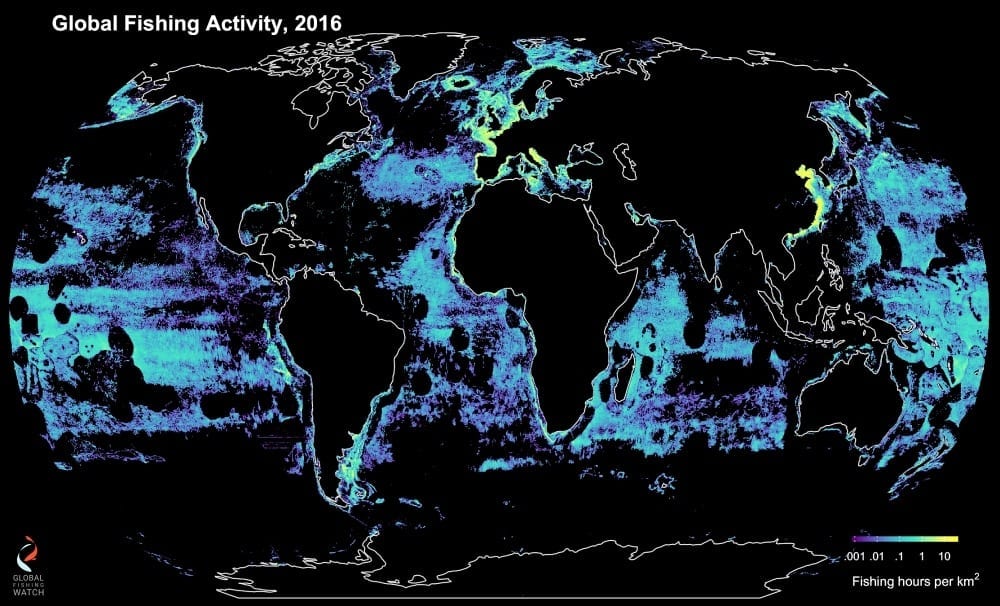
Scientists from the University of York have released a report highlighting the gap between declining wild fish supplies and healthy eating advice recommending more seafood.
While the health benefits of eating fish have become better appreciated in recent years, many wild fish stocks continue to be overfished.
In a study published in Marine Pollution Bulletin, Dr Ruth Thurstan, now a Research Fellow at the University of Queensland, and Professor Callum Roberts, Professor of Marine Conservation at the University of York, used historical fisheries data and population estimates to show how fish availability per person, both nationally and globally, have changed since records began.
Sifting through 124 years of fisheries landings records, the researchers found that UK domestic fishery landings have fallen to their lowest point for over 70 years. When they accounted for processing losses and human population growth, fish availability from domestic supplies showed an almost continual decrease since the early 20th century.
Today, domestic fish supplies fall far below consumption levels recommended by the Food Standards Agency, supplying just one fifth of the two portions per week advice. The shortfall has been masked in part by increased imports and aquaculture, which together raise the figure to four fifths.
The researchers say that global patterns in wild fish production reflect these worrying trends. In terms of fish available per person, supplies have been in decline for over 40 years, falling by nearly a third. Only rapid growth in fish farming has shielded consumers from the consequences of overfishing and human population increase. Half of our seafood now comes from farms. However, Dr Thurstan and Professor Roberts say that fish farming is not a win-win solution.
Professor Roberts said: “Many aquaculture operations inflict heavy environmental costs on wild fish stocks and coastal ecosystems, such as habitat loss, pollution, disease and pests. To be viable in the long-term and help feed the world, there has to be a Blue Revolution in fish farming to sustainable production methods. Better management of wild fisheries could also boost production while helping heal damage to ocean life.”
The Latest on: Wild fish stocks
[google_news title=”” keyword=”Wild fish stocks” num_posts=”10″ blurb_length=”0″ show_thumb=”left”]
via Google News
The Latest on: Wild fish stocks
- Swap salmon for sardines to keep four million tons of fish in the seaon May 7, 2024 at 5:00 pm
helping to regenerate wild fish stocks. Bivalve farms use up no land and no freshwater. They actually act as a carbon sink. But what if you like eating salmon? The use of alternative feeds in ...
- Vermont Fish and Wildlife announces date for this year's free fishing dayon May 7, 2024 at 3:08 pm
TOP STORIES FROM WPTZ: Special edition Stanley tumblers are selling out, but these are still in stock READ THE FULL STORY:Vermont Fish and Wildlife announces date for this year's free fishing day ...
- How active ETFs could help investors navigate recent wild swings in the stock marketon April 26, 2024 at 2:04 am
Signs of improving market breadth, beyond the tech giants, creates opportunities for the new wave of active exchange-traded funds.
- Reproductive success improves after a single generation in the wild for descendants of some hatchery Chinook salmonon April 15, 2024 at 5:00 pm
They found that first-generation, wild-born descendants of two hatchery-origin fish produced significantly ... transfers of non-local origin salmon stock; the conclusions also may not apply ...
- 12 Fish You Should Never Eat (and What to Eat Instead)on December 19, 2023 at 11:34 pm
It was not long ago that we rarely thought about where our food came from, let alone the how our choices impacted the environment, but these days many of us want to know not only what we’re ...
- Seafood Decision Guideon May 8, 2023 at 1:18 am
a practice that puts enormous additional stress on wild fish stocks. Scientific studies show the health benefits of a diet rich in elongated omega-3 fatty acids (DHA and EPA). These essential ...
- The Precarious State Of Seafood Todayon July 5, 2022 at 7:29 am
If we were to eliminate the 4 billion pounds of farmed salmon consumption annually, it would have devastating effects on wild seafood stocks. What do you consider the differences between wild and ...
- About the Projecton October 2, 2017 at 8:16 am
It’s now becoming clear that by reducing our take from the ocean and restoring wild fish stocks, we might also be helping life on land and ultimately the entire life-support systems of the planet.
- Fish Farmingon April 4, 2016 at 2:04 pm
According to the United Nations Food and Agriculture Organization, roughly 32% of world fish stocks are overexploited ... One significant issue is that—rather than easing the impact on wild ...
- Seafood Decision Guideon October 6, 2014 at 11:22 am
a practice that puts enormous additional stress on wild fish stocks. Scientific studies show the health benefits of a diet rich in elongated omega-3 fatty acids (DHA and EPA). These essential ...
via Bing News










